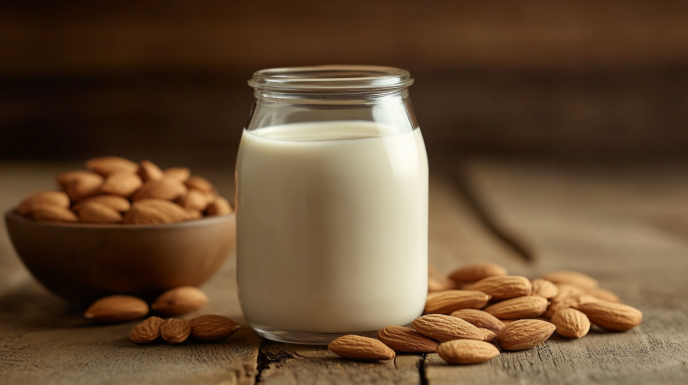
bettergoods Plant-Based Unsweetened Original Almondmilk, Half Gallon
- bettergoods Plant-Based Unsweetened Original Almondmilk, Half Gallon
- Smooth and delicious
- Perfect for savoring your morning coffee, enjoying a relaxing afternoon tea, or whipping up a culinary masterpiece
- Rich in calcium
Discover Why This Plant-Based Alternative Is Taking Over Refrigerators Nationwide
In the ever-expanding universe of plant-based milk alternatives, there’s a rising star that’s capturing the attention of health enthusiasts, environmental advocates, and culinary explorers alike. Bettergoods Almond Milk has revolutionized the non-dairy milk market with its exceptional quality, versatility, and nutritional profile. As someone who’s experimented with virtually every plant milk on the market, I was initially skeptical about whether another almond milk brand could truly stand out in an already crowded space. But after my first creamy sip of Bettergoods, I knew this wasn’t just another alternative—it was a game-changer.
Over the past few months, I’ve integrated Bettergoods Almond Milk into every aspect of my kitchen life—from my morning coffee ritual to elaborate dinner recipes—and I’m excited to share everything I’ve discovered about this remarkable product. Whether you’re a curious newcomer to plant-based milks or a seasoned dairy-free veteran looking for your next favorite brand, this comprehensive guide will answer all your questions about Bettergoods Almond Milk and why it might deserve a permanent spot in your refrigerator.
What Exactly Is Bettergoods Almond Milk?
At its core, Bettergoods Almond Milk is a plant-based beverage made primarily from almonds and water. But to describe it so simply would be doing it a disservice. Unlike many commercial almond milks that contain only a small percentage of actual almonds, Bettergoods prides itself on using a significantly higher almond content—creating a richer, more authentic flavor profile that truly celebrates the natural nuttiness of almonds.
The creation process begins with high-quality, sustainably sourced almonds that are carefully selected for optimal flavor and nutritional value. These almonds are soaked, blended with filtered water, and then strained to remove solid matter. What remains is a smooth, creamy liquid that serves as the perfect canvas for both sweet and savory culinary applications.
What truly sets Bettergoods apart from competitors is their commitment to minimal processing and clean ingredients. While many almond milk brands rely heavily on stabilizers, thickeners, and artificial additives to achieve their texture and shelf-life, Bettergoods takes a different approach. Their formulation focuses on preserving the natural integrity of the almonds while still delivering the consistency and longevity consumers expect.
The result is an almond milk that feels homemade in its purity but professional in its execution—striking that perfect balance between wholesome and convenient that busy health-conscious consumers are constantly seeking.
The Nutritional Powerhouse: Breaking Down Bettergoods’ Impressive Profile
For many of us, the switch to plant-based milk is driven by nutritional considerations. Bettergoods Almond Milk stands tall in this department with a nutrient profile worth celebrating.
A standard 8-ounce serving of Bettergoods Unsweetened Almond Milk typically contains approximately 30-40 calories, making it significantly lower in calories than conventional dairy milk. This makes it an excellent choice for those monitoring their caloric intake without wanting to sacrifice the creamy texture and versatility of milk in their diet.
The fat content in Bettergoods Almond Milk is primarily comprised of heart-healthy monounsaturated fats—the same beneficial fats found in olive oil that have been associated with improved cholesterol levels and reduced risk of heart disease. With approximately 2.5-3 grams of fat per serving, it provides enough richness to satisfy without overwhelming your daily fat allocation.
Protein content in almond milk is naturally lower than dairy milk, with Bettergoods containing around 1 gram per serving. However, what it lacks in protein, it makes up for in other essential nutrients. Bettergoods Almond Milk is fortified with calcium and vitamin D, providing approximately 30% of your daily calcium needs and 25% of your vitamin D requirements in a single serving.
For carbohydrate-conscious consumers, the unsweetened varieties contain less than 1 gram of carbs per serving, making them suitable for low-carb and ketogenic dietary approaches. The absence of naturally occurring lactose also makes Bettergoods an ideal option for those with lactose intolerance.
Perhaps most impressive is what Bettergoods doesn’t contain. Unlike many commercial almond milks, Bettergoods has made the conscious decision to exclude carrageenan—a controversial thickening agent that some studies have linked to digestive inflammation. Their commitment to clean nutrition extends to avoiding artificial colors, flavors, and preservatives, ensuring you’re nourishing your body with ingredients you can feel good about.
Where to Find Your Bettergoods Fix
One of the most frequent questions I receive about Bettergoods Almond Milk is where to purchase it. As the brand has grown in popularity, so has its availability. Bettergoods has successfully secured placement in a diverse range of retail locations, making it increasingly accessible regardless of where you live.
Major national grocery chains including Whole Foods Market, Sprouts, and Natural Grocers regularly stock Bettergoods products in their refrigerated plant-based sections. More conventional supermarkets like Kroger, Safeway, and Publix have also begun carrying select Bettergoods varieties in response to growing consumer demand.
For those who prefer online shopping, Bettergoods offers direct-to-consumer purchasing through their official website, where you can subscribe to regular deliveries and often access exclusive flavors or limited-edition products not available in retail locations. Major e-commerce platforms including Amazon, Thrive Market, and Instacart also carry Bettergoods products, often with competitive pricing and convenient delivery options.
If you’re having trouble locating Bettergoods in your area, the company’s website features a store locator tool that allows you to input your zip code and find the nearest retailers carrying their products. This tool is regularly updated as new distribution partnerships are formed.
It’s worth noting that availability can sometimes vary by product line. While the original unsweetened and vanilla varieties tend to be most widely distributed, some of the specialty flavors or limited editions may have more selective availability.
The Investment in Quality: Understanding Bettergoods’ Price Point
Let’s address the elephant in the room—yes, Bettergoods Almond Milk typically commands a slightly higher price point than some mainstream almond milk brands. A half-gallon container generally retails between $4.99 and $5.99, depending on the retailer and whether you’re purchasing a basic or specialty variety.
While this represents a premium over conventional dairy milk and some competing almond milk brands, loyal customers consistently report that the superior quality and taste justify the additional investment. When compared to other premium plant-based milk brands with similar quality standards, Bettergoods actually offers competitive pricing.
For the budget-conscious, there are several ways to make Bettergoods more affordable. Purchasing in bulk, either through wholesale clubs like Costco (where available) or through subscription services on their website, can reduce the per-unit cost substantially. Many retailers also offer periodic sales or promotions that can bring the price down by 15-20%.
It’s also worth considering the versatility factor—many consumers report that because of Bettergoods’ superior flavor and performance in recipes, they’re able to use it across more applications than other plant milks, eliminating the need to purchase multiple types of milk alternatives for different uses.
When evaluating the cost, it’s important to consider the broader context of what you’re paying for. Bettergoods’ commitment to higher almond content, clean ingredients, sustainable sourcing practices, and ethical production methods all contribute to the price structure. For many consumers, these values align with their own priorities, making the premium feel like a worthwhile investment in both their health and their principles.
The Clean Label Promise: Decoding Bettergoods’ Ingredients
In an era where consumers are increasingly scrutinizing ingredient lists, Bettergoods stands proud with a refreshingly clean label. Their commitment to transparency and minimal processing has earned them a devoted following among health-conscious shoppers.
The base Bettergoods Unsweetened Almond Milk contains just five core ingredients: filtered water, almonds, calcium carbonate, sea salt, and vitamins D2 and B12. The absence of additives like carrageenan, guar gum, and locust bean gum—common in many commercial plant milks—reflects the company’s philosophy that simpler is better.
For those with dietary restrictions or preferences, Bettergoods checks many important boxes. All Bettergoods Almond Milk varieties are certified gluten-free, making them safe for those with celiac disease or gluten sensitivity. The entire product line is also dairy-free, soy-free, and vegan-friendly, accommodating a wide range of dietary needs.
The unsweetened varieties contain no added sugars, while the sweetened options use organic cane sugar in modest amounts. For those seeking flavored options without added sugars, Bettergoods offers naturally flavored unsweetened varieties using pure vanilla and cocoa.
Organic certification is another key differentiator for Bettergoods. All Bettergoods Almond Milk varieties are USDA Certified Organic, ensuring that the almonds are grown without synthetic pesticides or fertilizers and that all other ingredients meet strict organic standards. This commitment to organic practices extends beyond the final product to their entire supply chain, reflecting a holistic approach to quality and sustainability.
For keto enthusiasts, the unsweetened varieties contain less than 1 gram of carbohydrates per serving, making them fully compatible with ketogenic dietary approaches. The absence of added sugars and low natural carbohydrate content has made Bettergoods a favorite among the low-carb community.
Flavor Varieties: Something for Every Palate
While Bettergoods’ original unsweetened almond milk serves as the foundation of their product line, the brand has thoughtfully expanded to include a diverse array of flavors and formulations to suit different preferences and culinary applications.
The core lineup includes:
- Unsweetened Original – The purest expression of Bettergoods’ almond milk, with a clean, subtle nuttiness that makes it incredibly versatile for both sweet and savory applications.
- Unsweetened Vanilla – A delicate hint of real vanilla beans enhances the almond flavor without adding sweetness, perfect for morning coffee or overnight oats.
- Original (Lightly Sweetened) – For those who prefer a touch of sweetness, this variety contains a modest amount of organic cane sugar that enhances rather than overwhelms the natural almond flavor.
- Vanilla – The harmonious combination of vanilla and light sweetness makes this variety a favorite for drinking straight or using in dessert recipes.
- Chocolate – Rich, indulgent cocoa pairs with the smooth almond base to create a treat that satisfies chocolate cravings with far less sugar than conventional chocolate milk.
- Barista Blend – Specifically formulated to perform beautifully in coffee and tea applications, this variety steams, froths, and blends without separating, making it a favorite among home baristas and professional coffee shops alike.
- Protein+ – Enhanced with pea protein, this variety delivers 10 grams of plant protein per serving, ideal for fitness enthusiasts or those looking to increase their protein intake.
- Seasonal Limited Editions – Throughout the year, Bettergoods releases special flavors like Pumpkin Spice, Maple, and Mint Chocolate, creating excitement and variety for loyal customers.
Each variety is available in both refrigerated and shelf-stable packaging, though availability may vary by retailer. The shelf-stable versions undergo ultra-high-temperature pasteurization and aseptic packaging, allowing them to be stored unopened at room temperature for up to 10 months—perfect for stocking your pantry or emergency supplies.
Culinary Versatility: From Morning Coffee to Gourmet Dinners
One of Bettergoods’ greatest strengths is its remarkable versatility in the kitchen. Unlike some almond milks that perform well in certain applications but fall short in others, Bettergoods consistently delivers excellent results across a wide spectrum of culinary uses.
In your morning coffee or tea, Bettergoods doesn’t separate or curdle, even in acidic or hot beverages. The Barista Blend, in particular, creates silky microfoam when steamed, allowing you to create cafe-quality lattes and cappuccinos at home.
For breakfast applications, Bettergoods shines in smoothies, providing a creamy base without overpowering other flavors. It performs beautifully in overnight oats, chia puddings, and breakfast baking recipes like muffins and quick breads.
When it comes to savory cooking, Bettergoods is exceptionally stable at high temperatures, making it suitable for creating creamy soups, sauces, and gravies. Its neutral flavor profile in the unsweetened variety allows it to adapt to everything from Indian curries to Italian cream sauces without introducing competing flavors.
Bakers have particularly embraced Bettergoods for its reliable performance in delicate recipes. It can be substituted 1:1 for dairy milk in most baking applications, from cakes and cookies to bread and pastries. The consistent texture and composition mean you won’t need to adjust other ingredients to compensate, as is sometimes necessary with other plant milks.
Even in frozen applications, Bettergoods maintains its integrity, making it an excellent base for dairy-free ice creams, popsicles, and frozen desserts. The higher fat content compared to some other almond milks contributes to a creamier frozen texture with less crystallization.
Professional chefs and home cooks alike have noted that Bettergoods’ performance in recipes most closely resembles dairy milk, allowing for easier adaptation of traditional recipes without sacrificing texture or flavor. This universal adaptability eliminates the need to keep multiple types of plant milk on hand for different uses—a practical consideration for those with limited refrigerator space.
Sustainability Commitment: Beyond the Carton
For environmentally conscious consumers, Bettergoods’ sustainability initiatives represent another compelling reason to choose their products. While almond cultivation has faced criticism for its water usage, particularly in drought-prone California, Bettergoods has implemented several strategies to minimize their environmental footprint.
Their almond sourcing prioritizes farms employing water-efficient irrigation systems and sustainable farming practices. By working directly with select growers who share their environmental values, Bettergoods maintains visibility throughout their supply chain and can influence growing practices beyond what organic certification requires.
The packaging itself reflects their ecological mindset. All Bettergoods cartons are made from FSC-certified paperboard, ensuring the paper comes from responsibly managed forests. The company has also begun transitioning to plant-based caps derived from sugarcane rather than conventional plastic, reducing their petroleum dependence.
For their shelf-stable products, Bettergoods utilizes innovative aseptic packaging technology that eliminates the need for refrigeration during transport and storage until opening. This significantly reduces the carbon footprint associated with cold-chain distribution and storage.
The company has also implemented a comprehensive zero-waste initiative in their production facilities, diverting over 95% of manufacturing waste from landfills through composting, recycling, and innovative repurposing programs. Almond pulp left over from the milk-making process is upcycled into other food products or animal feed rather than being discarded.
Bettergoods’ annual sustainability report transparently documents their environmental impact and progress toward ambitious goals, including becoming carbon-neutral by 2026. This commitment to continuous improvement in environmental practices resonates strongly with consumers who want their purchasing decisions to align with their values.
The Verdict from Consumers: What Real Users Say
Perhaps the most telling testament to Bettergoods’ quality comes from the enthusiastic community of loyal customers who have made it their almond milk of choice. Across various review platforms, Bettergoods consistently earns ratings between 4.5 and 5 stars, with particularly high marks for taste, texture, and ingredient quality.
Consumers frequently praise the authentic almond flavor, describing it as “fresh,” “homemade,” and “not watery like other brands.” The creamy consistency receives consistent accolades, with many noting that it behaves more like dairy milk in recipes than other plant-based alternatives they’ve tried.
Parents particularly appreciate the clean ingredient list, with many commenting that Bettergoods is the only store-bought almond milk they feel comfortable serving their children. The absence of carrageenan is frequently cited as a decisive factor for those with sensitive digestive systems who have experienced discomfort with other commercial brands.
Coffee enthusiasts form a particularly vocal segment of Bettergoods’ fan base, with the Barista Blend receiving phenomenal reviews for its performance in espresso drinks. Numerous reviewers mention switching to Bettergoods specifically because it doesn’t separate in coffee, a common complaint with other almond milk brands.
The higher price point does appear in some reviews as a consideration, but it’s typically framed as a worthwhile investment rather than a deterrent. As one reviewer succinctly put it, “You get what you pay for—and with Bettergoods, you’re paying for quality you can taste.”
Criticism, when it appears, tends to focus on availability issues rather than product quality. Some consumers in rural areas or smaller markets express frustration that Bettergoods isn’t yet widely distributed in their region, though the company’s expansion efforts are gradually addressing this concern.
How Bettergoods Stacks Up Against the Competition
The plant-based milk aisle has become increasingly crowded in recent years, with established players like Almond Breeze and Silk dominating market share. How does Bettergoods compare to these industry giants?
When compared to Almond Breeze, Bettergoods typically contains a higher percentage of actual almonds, resulting in a more pronounced almond flavor and creamier texture. While Almond Breeze has the advantage of widespread availability and a slightly lower price point, Bettergoods edges ahead in taste tests and has a cleaner ingredient list without carrageenan or other controversial additives.
Silk Almond Milk, another major competitor, offers similar nutritional values to Bettergoods but generally contains more thickeners and stabilizers. Bettergoods’ organic certification also differentiates it from Silk’s conventional offerings, though Silk does offer an organic line at a comparable price point. In culinary applications, particularly cooking and baking, Bettergoods typically performs more reliably than Silk, with less tendency to separate when heated.
Smaller premium brands like Califia Farms and Malk represent more direct competition for Bettergoods in terms of quality positioning and price point. Califia offers similar aesthetic appeal and taste quality but uses more additives than Bettergoods. Malk parallels Bettergoods’ commitment to minimal ingredients but has more limited distribution and flavor options.
Ultimately, Bettergoods has carved out a distinctive position by offering the widespread appeal and versatility of mainstream brands with the ingredient integrity and quality of boutique producers. This middle path—exceptional quality without excessive exclusivity—has enabled Bettergoods to attract consumers migrating both up from conventional brands and down from ultra-premium options that might be prohibitively expensive for everyday use.
Finding the Best Deals: Maximizing Value
While Bettergoods represents a premium product at a corresponding price point, savvy shoppers have discovered several strategies for enjoying this high-quality almond milk at more affordable rates.
Subscription services offer perhaps the most consistent savings. Bettergoods’ own website offers a subscription option that typically reduces the per-unit price by 10-15% and includes free shipping on orders over a certain threshold. Similar savings can be found through Amazon’s Subscribe & Save program for Bettergoods products.
Seasonal promotions coinciding with health-focused times of year (January resolutions, “Veganuary,” Earth Month in April) often feature Bettergoods products at promotional pricing. Signing up for the brand’s email newsletter ensures you’ll be notified of these limited-time offers.
Many natural food stores and co-ops offer member pricing that can significantly reduce the cost of Bettergoods products. Some retailers also offer case discounts of 10% or more when purchasing 12 or more units at once—an excellent option for the shelf-stable varieties that can be stored long-term.
Digital coupon platforms like Ibotta, Checkout 51, and store-specific apps frequently feature Bettergoods rebates that can be stacked with in-store sales for maximum savings. For those willing to be flexible about flavors, clearance sections often include seasonal Bettergoods varieties at steep discounts as they make room for new releases.
Budget-conscious consumers who primarily use almond milk in cooking rather than drinking it straight sometimes opt for the shelf-stable versions, which typically cost slightly less than their refrigerated counterparts while maintaining the same nutritional profile and ingredient quality.
Looking Forward: What’s Next for Bettergoods
As Bettergoods continues to gain market share and loyal followers, the company has hinted at several exciting developments on the horizon. Industry insiders suggest that expansion into additional plant-based offerings beyond almond milk may be forthcoming, potentially including oat, cashew, and macadamia-based alternatives that maintain the same commitment to quality and clean ingredients.
The company has also indicated plans to introduce larger bulk-size options in response to consumer requests, which would not only reduce packaging waste but also offer better value for high-volume users. A gallon option is reportedly in development, particularly for the most popular unsweetened varieties.
Innovation in sustainable packaging continues to be a priority, with biodegradable alternatives to current packaging materials undergoing testing. The company’s R&D department is actively exploring fully compostable packaging solutions that would maintain product safety and shelf stability while further reducing environmental impact.
For those interested in the brand’s future direction, following Bettergoods on social media provides the most up-to-date information on new releases, limited editions, and expansion plans. The company has built a reputation for being responsive to customer feedback, frequently incorporating suggestions from their community into product development.
Conclusion: Why Bettergoods Deserves a Place in Your Kitchen
After thoroughly exploring every aspect of Bettergoods Almond Milk—from its nutritional profile and ingredient quality to its culinary versatility and environmental impact—it’s clear why this brand has developed such a devoted following. In a market saturated with options, Bettergoods has distinguished itself through an unwavering commitment to excellence in every dimension.
Whether you’re a longtime plant milk enthusiast or someone just beginning to explore dairy alternatives, Bettergoods offers an exceptional entry point that doesn’t require compromising on taste, nutrition, or values. Its remarkable adaptability across culinary applications means you can simplify your shopping list while expanding your cooking repertoire.
The slightly higher price point reflects a genuine investment in quality that manifests in every sip and recipe. By choosing Bettergoods, you’re not just purchasing a product—you’re supporting a company that’s actively working to raise industry standards for transparency, sustainability, and ingredient integrity.
As plant-based eating continues to move from trend to lifestyle for millions of consumers, brands like Bettergoods play a crucial role in demonstrating that choosing alternatives doesn’t mean settling for less. With its perfect balance of practical accessibility and aspirational quality, Bettergoods Almond Milk has rightfully earned its place as a pantry staple for discerning food lovers everywhere.
If you haven’t yet experienced what makes Bettergoods different, consider this your invitation to discover why so many consumers have made the switch and never looked back. Your morning coffee—and everything else in your culinary repertoire—will thank you.







